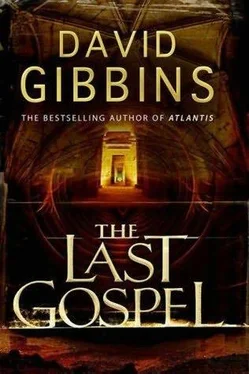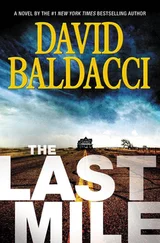David Gibbins - The Last Gospel
Здесь есть возможность читать онлайн «David Gibbins - The Last Gospel» весь текст электронной книги совершенно бесплатно (целиком полную версию без сокращений). В некоторых случаях можно слушать аудио, скачать через торрент в формате fb2 и присутствует краткое содержание. Жанр: Прочие приключения, на английском языке. Описание произведения, (предисловие) а так же отзывы посетителей доступны на портале библиотеки ЛибКат.
- Название:The Last Gospel
- Автор:
- Жанр:
- Год:неизвестен
- ISBN:нет данных
- Рейтинг книги:5 / 5. Голосов: 1
-
Избранное:Добавить в избранное
- Отзывы:
-
Ваша оценка:
- 100
- 1
- 2
- 3
- 4
- 5
The Last Gospel: краткое содержание, описание и аннотация
Предлагаем к чтению аннотацию, описание, краткое содержание или предисловие (зависит от того, что написал сам автор книги «The Last Gospel»). Если вы не нашли необходимую информацию о книге — напишите в комментариях, мы постараемся отыскать её.
The Last Gospel — читать онлайн бесплатно полную книгу (весь текст) целиком
Ниже представлен текст книги, разбитый по страницам. Система сохранения места последней прочитанной страницы, позволяет с удобством читать онлайн бесплатно книгу «The Last Gospel», без необходимости каждый раз заново искать на чём Вы остановились. Поставьте закладку, и сможете в любой момент перейти на страницу, на которой закончили чтение.
Интервал:
Закладка:
Suddenly he was alone. Ahead of him the causeway disappeared into a cavernous darkness, a place where the rising heat of the pit met a chill exhalation from within, to form a shimmering mirage. He reached for the dice he always kept in his pocket, turning them round and round, trying to calm his tremor. It was said that the cave had a hundred entrances, each one with a voice. Beside him was a low basin, and he dipped his hand in the lustral waters, splashing his face. In front of him was a low stone table, wisps of brown smoke rising from a smouldering mass spread over the surface. Eagerly he lurched over, grasping the smoothed edges of the table, his eyes tightly shut, sucking the smoke deep into his lungs, coughing and retching, holding it there. Pliny called it the opium bactrium, the extract of poppy brought from the far-off kingdom of Bactria in the east, from the bleak mountain valleys conquered by Alexander the Great. But here they called it the gift of Morpheus, god of dreams. He sucked in again, feeling the heady rush that reached into his limbs, bringing feeling back where it had almost gone, dulling the pain. He needed it more now, needed it every night. He leaned back, and felt as if he were floating, face upwards and arms outstretched. For a fleeting moment he was back again in the other place where he had sought healing, long ago beside the lake in Galilee, laughing and drinking with his friends Herod and Cypros and his beloved Calpurnia, with the Nazarene and his woman, where he had been touched by one who had known his destiny, who had foreseen this very day itself.
He opened his eyes. Something was coming from the cave, a writhing, undulating form that seemed to press against the mirage like a phoenix rising. It broke through, and he saw a huge serpent, standing upright as tall as he was, its flat head lowered and its tongue flicking in and out, swaying from side to side. Pliny had told him these were hallucinations brought on by the morpheum, but as the snake drooped down and slithered round his legs the old man felt the silky sheen of its skin, and smelled its musty, acrid odour. Then it slid away, slithering into a crack at the side of the cave, and there was another smell, overpowering the sulphur and the morpheum and the snake, a smell like a chill wind wafting through a rotting tomb, a smell of ancient decay. Something flickered, a shape barely visible in the darkness. She was here.
‘ Clau-Clau-Claudius.’
There was a low moan, then a sound like a mocking laugh, and then a sigh that echoed through all the different passageways in the rock, before it died away. Claudius peered into the darkness, waiting, his head spinning. It was said that she had lived for seven hundred ages of men, that Apollo had granted her as many years as the grains of sand she could hold in her hands, but that the god had refused her eternal youth after she had spurned his advances. All Apollo had allowed was the voice of a young woman, so that as she shrank and decayed the voice of her youth remained to torment her, to remind her of the immortality she had forsaken. And now she was the last of them, the last of the oracles of the earth goddess Gaia, last of the thirteen. She who had held sway in her lair since before Rome was founded, bewitching all who came before her, whose riddles had brought emperors to their knees.
‘S-Sibyl.’ Claudius broke the silence, his voice tremulous, harsh with the sulphur. ‘I have d-done as you instructed. I did what you ordered me to do for the Vestals, in Rome. And now I have been to the thirteenth, to Andraste. I have been to her tomb. I have taken it to her. The prophecy is fulfilled.’
He dropped a bag of coins he had been carrying, and they clunked out, dull gold and silver, the last batch he had saved for this night, coins bearing his portrait. A shaft of light fell in front of the table, revealing the worn stone surface of the passageway beneath the swirls of vapour. On the floor were leaves, oak leaves arranged like words, the inked Greek letter on each leaf just visible. Claudius lurched forward, falling on his hands and knees and peering at the leaves, desperate to read the message. Suddenly there was a gust and they were gone. He cried out, then slowly bowed his head, his words rent with despair. ‘You took my ancestor Aeneas to see his dead father Anchises. He came here after Troy, seeking the underworld on his way to found Rome. All I asked was to see my father Drusus. My dear brother Germanicus. My son Britannicus. To glimpse them in Elysium, before Charon takes me where he will.’
There was another moan, thinner this time, then a shriek that seemed to come from everywhere at once, as if all hundred mouths of the cave were turning inwards on him.
‘ Day of wrath and terror looming!
Heaven and earth to ash consuming,
Clau-Clau-Claudius’ words and Sibyl’s truth foredooming! ’
Claudius staggered to his feet, his body shaking and jerking, convulsed with fear. He peered again at the pool of light. Where the leaves had been was now a pile of sand, the grains trickling down the sides. He watched as a final sprinkle fell from somewhere high above, a shimmer that dropped like a translucent curtain. Then everything was still. He looked around, and realized that the snake had gone, had sloughed off its skin and left it empty in front of him, had slithered down into the poison above the crater floor. He remembered the words of Virgil again, the coming of the Golden Age. And the serpents too shall die.
Claudius felt his head clear, and saw the mirage in front of the cave drop away. He was suddenly desperate to leave, to cast aside the yearning that had bound him to this place and to the Sibyl for so long, to return to his villa beneath Vesuvius to finish the work that he and Pliny had planned for that evening, to fulfil the promise he had made by that lake so long ago. He turned to go, then felt something on the back of his neck, a touch of cold that made his hairs stand on end. He thought he heard his name again, softly whispered, but this time they were the words of an old woman, impossibly old, and were followed by a rustling like a death rattle coming closer. He dared not turn around. He began pressing forward, limping and slipping over the rock, looking around frantically for Narcissus. Over the lip of the crater he could see the dark form of the mountain, its summit wreathed in flickering lightning like a burning crown of thorns. The clouds were rushing overhead, tumbling and darkening, glowing orange and red as if they were on fire. He felt a terrible fear, then a sudden lucidity, as if all his memories and dreams had been sucked out of him by the vortex ahead. It was as if history itself had sped up, history which he had kept at bay since vanishing from Rome half a lifetime ago, history which had waited for him like a coiled spring that could no longer be held back.
He staggered on. Behind him he felt a baleful presence pushing him forward, onward through the sulphurous haze towards the floor of the crater. He grasped the dice again, pulled them out of his pocket then dropped them, heard them rattle on the rocks then stop. He looked despairingly, but saw nothing. On either side spectral forms emerged from the pit, no longer in supplication but joining him like a silent army, shrouded in hot flecks of ash which had begun to fall from the sky like snow. He felt his mouth go dry, a desperate thirst. On the top of Vesuvius he saw a burning ring of fire, racing down the slopes towards the towns, fields of flames in its wake. Then the scene was obliterated by blackness, a swirling funnel that descended into the crater and blotted out all but the narrowing void ahead. He heard screams, a muffled roar, saw bodies ignite like torches in the darkness, one after the other. He was getting closer. Now he knew, with dread certainty. The Sibyl had kept her promise. He would follow in the footsteps of Aeneas.
Читать дальшеИнтервал:
Закладка:
Похожие книги на «The Last Gospel»
Представляем Вашему вниманию похожие книги на «The Last Gospel» списком для выбора. Мы отобрали схожую по названию и смыслу литературу в надежде предоставить читателям больше вариантов отыскать новые, интересные, ещё непрочитанные произведения.
Обсуждение, отзывы о книге «The Last Gospel» и просто собственные мнения читателей. Оставьте ваши комментарии, напишите, что Вы думаете о произведении, его смысле или главных героях. Укажите что конкретно понравилось, а что нет, и почему Вы так считаете.












